第三章-1.英汉词汇现象的对比案例
- 格式:ppt
- 大小:939.50 KB
- 文档页数:50
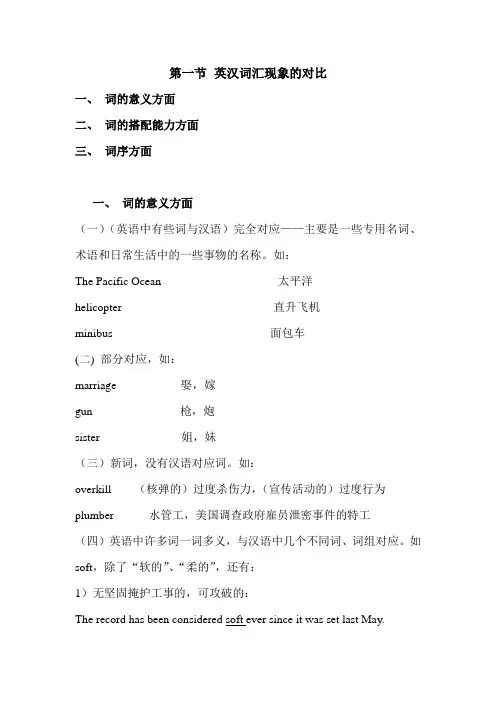
第一节英汉词汇现象的对比一、词的意义方面二、词的搭配能力方面三、词序方面一、词的意义方面(一)(英语中有些词与汉语)完全对应——主要是一些专用名词、术语和日常生活中的一些事物的名称。
如:The Pacific Ocean 太平洋helicopter 直升飞机minibus 面包车(二) 部分对应,如:marriage 娶,嫁gun 枪,炮sister 姐,妹(三)新词,没有汉语对应词。
如:overkill (核弹的)过度杀伤力,(宣传活动的)过度行为plumber 水管工,美国调查政府雇员泄密事件的特工(四)英语中许多词一词多义,与汉语中几个不同词、词组对应。
如soft,除了“软的”、“柔的”,还有:1)无坚固掩护工事的,可攻破的:The record has been considered soft ever since it was set last May.2)宇宙飞船的着陆飞行速度在32公里/小时左右,软着陆:The landing must be super-soft, made at a velocity of 18 miles or so an hour.3)毒性较轻的,软性的:Marijuana(大麻) is usually regarded as a soft drug..4)非百分之百可靠的:At this stage there is only soft intelligence about the enemy intention. We should not take action.作业:soft pillow soft cushion soft music soft woodSoft breeze soft drink soft money soft light Soft voice soft fire soft hat soft answerSoft heart soft words soft goods soft water又如total,除了“总数达…”、“合计”外,还有1)彻底撞毁A POW returnee was given a new Ford by a Denver dealer and totaled it the next month.2)向…报复Did you at least total the guy that hit you?二、词的搭配能力方面英语词一词多义,搭配范围广。
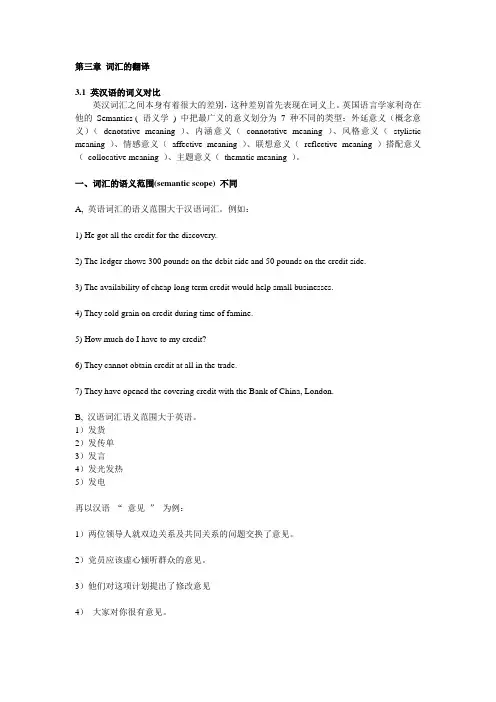
第三章词汇的翻译3.1 英汉语的词义对比英汉词汇之间本身有着很大的差别,这种差别首先表现在词义上。
英国语言学家利奇在他的Semantics ( 语义学) 中把最广义的意义划分为7 种不同的类型:外延意义(概念意义)(denotative meaning )、内涵意义(connotative meaning )、风格意义(stylistic meaning )、情感意义(affective meaning )、联想意义(reflective meaning )搭配意义(collocative meaning )、主题意义(thematic meaning )。
一、词汇的语义范围(semantic scope) 不同A, 英语词汇的语义范围大于汉语词汇。
例如:1) He got all the credit for the discovery.2) The ledger shows 300 pounds on the debit side and 50 pounds on the credit side.3) The availability of cheap long term credit would help small businesses.4) They sold grain on credit during time of famine.5) How much do I have to my credit?6) They cannot obtain credit at all in the trade.7) They have opened the covering credit with the Bank of China, London.B, 汉语词汇语义范围大于英语。
1)发货2)发传单3)发言4)发光发热5)发电再以汉语“意见”为例:1)两位领导人就双边关系及共同关系的问题交换了意见。
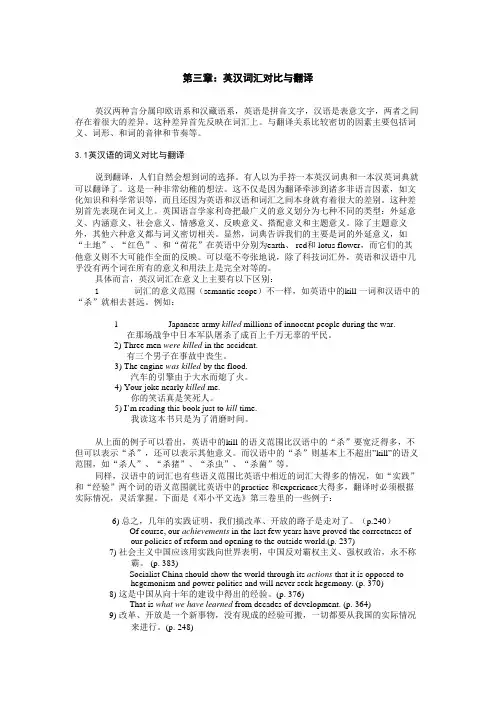
第三章:英汉词汇对比与翻译英汉两种言分属印欧语系和汉藏语系,英语是拼音文字,汉语是表意文字,两者之间存在着很大的差异。
这种差异首先反映在词汇上。
与翻译关系比较密切的因素主要包括词义、词形、和词的音律和节奏等。
3.1英汉语的词义对比与翻译说到翻译,人们自然会想到词的选择。
有人以为手持一本英汉词典和一本汉英词典就可以翻译了。
这是一种非常幼稚的想法。
这不仅是因为翻译牵涉到诸多非语言因素,如文化知识和科学常识等,而且还因为英语和汉语和词汇之间本身就有着很大的差别。
这种差别首先表现在词义上。
英国语言学家利奇把最广义的意义划分为七种不同的类型:外延意义、内涵意义、社会意义、情感意义、反映意义、搭配意义和主题意义。
除了主题意义外,其他六种意义都与词义密切相关。
显然,词典告诉我们的主要是词的外延意义,如“土地”、“红色”、和“荷花”在英语中分别为earth、 red和 lotus flower,而它们的其他意义则不大可能作全面的反映。
可以毫不夸张地说,除了科技词汇外,英语和汉语中几乎没有两个词在所有的意义和用法上是完全对等的。
具体而言,英汉词汇在意义上主要有以下区别:1 词汇的意义范围(semantic scope)不一样,如英语中的kill 一词和汉语中的“杀”就相去甚远。
例如:1 Japanesekilled millions of innocent people during the war.army在那场战争中日本军队屠杀了成百上千万无辜的平民。
2) Three men were killed in the accident.有三个男子在事故中丧生。
3) The engine was killed by the flood.汽车的引擎由于大水而熄了火。
4) Your joke nearly killed me.你的笑话真是笑死人。
5) I’m reading this book just to kill time.我读这本书只是为了消磨时间。
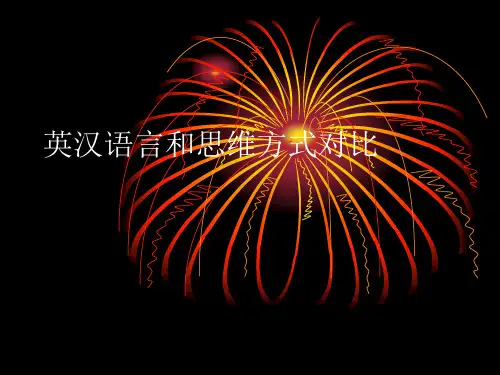
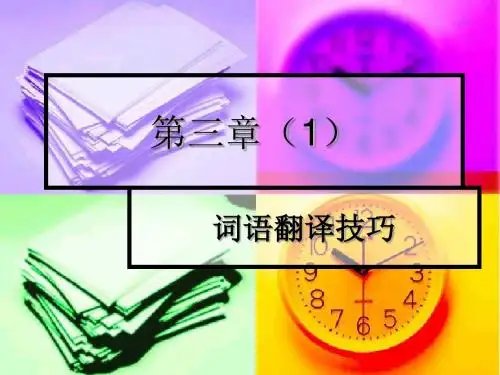
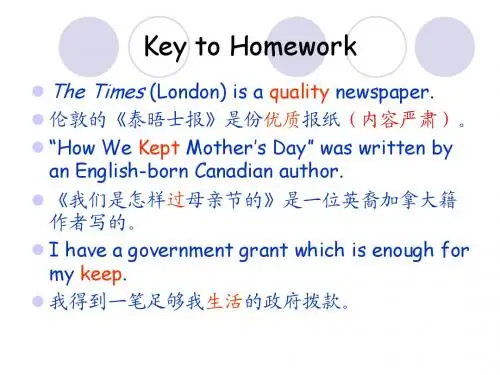
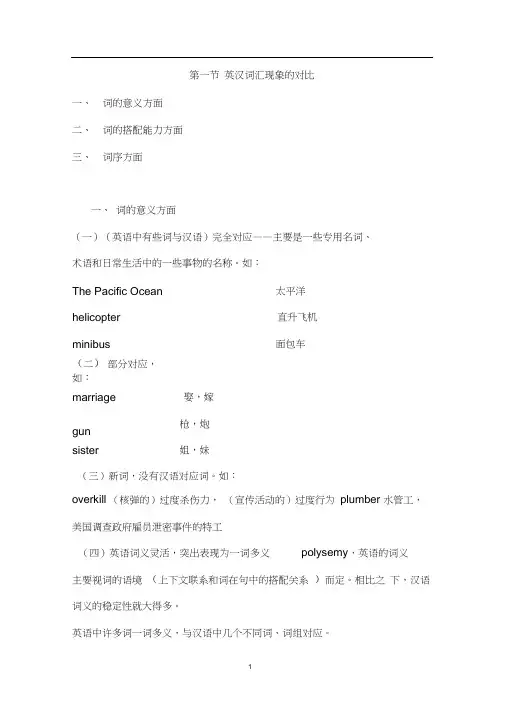
第一节英汉词汇现象的对比一、词的意义方面二、词的搭配能力方面三、词序方面一、词的意义方面(一)(英语中有些词与汉语)完全对应——主要是一些专用名词、术语和日常生活中的一些事物的名称。
如:The Pacific Ocean 太平洋helicopter 直升飞机minibus 面包车(二)部分对应,如:marriage 娶,嫁枪,炮gunsister 姐,妹(三)新词,没有汉语对应词。
如:overkill (核弹的)过度杀伤力,(宣传活动的)过度行为plumber 水管工,美国调查政府雇员泄密事件的特工(四)英语词义灵活,突出表现为一词多义polysemy,英语的词义主要视词的语境(上下文联系和词在句中的搭配关系)而定。
相比之下,汉语词义的稳定性就大得多。
英语中许多词一词多义,与汉语中几个不同词、词组对应。
如soft,除了“软的”、“柔的”,还有:1)无坚固掩护工事的,可攻破的:The record has bee n con sidered soft ever since it was set last May. 2)宇宙飞船的着陆飞行速度在32公里/小时左右,软着陆:The landing must be super-soft, made at a velocity of 18 miles or so an hour.3)毒性较轻的,软性的:Marijuana(大麻)is usually regarded as a soft drug..4)非百分之百可靠的:At this stage there is only soft intelligence about the enemy intention. We should not take acti on.作业:soft pillow soft cushion soft music soft woodSoft breeze soft drink soft m oney soft lightSoft voice soft fire soft hat soft an swerSoft heart soft words soft g oods soft water又如total,除了“总数达…”、“合计”外,还有1) 彻底撞毁A POW returnee was given a new Ford by a Denver dealer and totaled it the n ext mon th.2) 向…报复Did you at least total the guy that hit you?如story(1) 事件、事情、情况、情形:1) This war is becoming the most important story of this generation.2) It is quite ano ther story now.(2) 报导、消息、电讯:Last December, the Post first reported that probes were being madein each of those cities, but officials refused to con firm the story.⑶内容、内情、真相:Some reporters who were not in cluded in the sessi on broke the story.⑷传说、说法:He' ll be very happy if that story holds up.(5) 热门、谎言、有意的渲染:The story about him became smaller and by and by faded out from the America n televisi on.(6) 身世、遭遇:The story of Rita Hayworth is one of the saddest.(7) 情节、案情:A young man came to Scotti ' s office with a story.作业:1. He is the last man to come.2. He is the last man to do it.3. He is the last person for such a job.4. He should be the last man to blame.5. He is the last man to consult.6. This is the last place where I expected to meet you.2.英汉词义辨析法任何一个词都可能有三个词义:一是结构词义,二是涉指词义,三是情景词义。
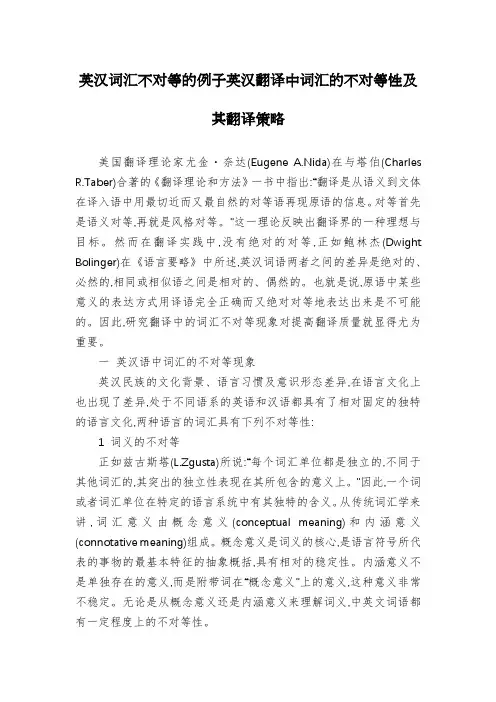
英汉词汇不对等的例子英汉翻译中词汇的不对等性及其翻译策略美国翻译理论家尤金・奈达(Eugene A.Nida)在与塔伯(Charles R.Taber)合著的《翻译理论和方法》一书中指出:“翻译是从语义到文体在译入语中用最切近而又最自然的对等语再现原语的信息。
对等首先是语义对等,再就是风格对等。
”这一理论反映出翻译界的一种理想与目标。
然而在翻译实践中,没有绝对的对等,正如鲍林杰(Dwight Bolinger)在《语言要略》中所述,英汉词语两者之间的差异是绝对的、必然的,相同或相似语之间是相对的、偶然的。
也就是说,原语中某些意义的表达方式用译语完全正确而又绝对对等地表达出来是不可能的。
因此,研究翻译中的词汇不对等现象对提高翻译质量就显得尤为重要。
一英汉语中词汇的不对等现象英汉民族的文化背景、语言习惯及意识形态差异,在语言文化上也出现了差异,处于不同语系的英语和汉语都具有了相对固定的独特的语言文化,两种语言的词汇具有下列不对等性:1 词义的不对等正如兹古斯塔(L.Zgusta)所说:“每个词汇单位都是独立的,不同于其他词汇的,其突出的独立性表现在其所包含的意义上。
”因此,一个词或者词汇单位在特定的语言系统中有其独特的含义。
从传统词汇学来讲,词汇意义由概念意义(conceptual meaning)和内涵意义(connotative meaning)组成。
概念意义是词义的核心,是语言符号所代表的事物的最基本特征的抽象概括,具有相对的稳定性。
内涵意义不是单独存在的意义,而是附带词在“概念意义”上的意义,这种意义非常不稳定。
无论是从概念意义还是内涵意义来理解词义,中英文词语都有一定程度上的不对等性。
2 概念意义的不对等在中英文中有的词汇概念意义是不对等的,如中英文在称谓上的词汇就不完全对等。
汉语中的称谓讲究:长幼有序,内外有别,男女有别。
而英语中的称谓基本上只进行性别的区分。
如汉语中的“伯父”、“叔父”、“姑父”、“姨夫”、“舅舅”等,在英语中只有uncle一词来统指父系尊长,aunt表示母系尊长,sister 表示姐姐或妹妹,brother指哥哥或弟弟。
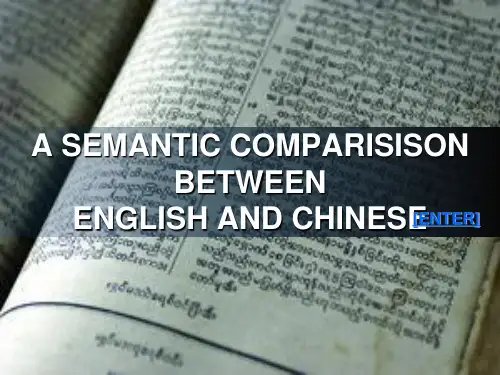
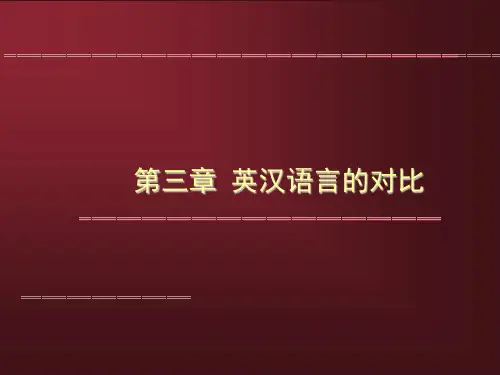
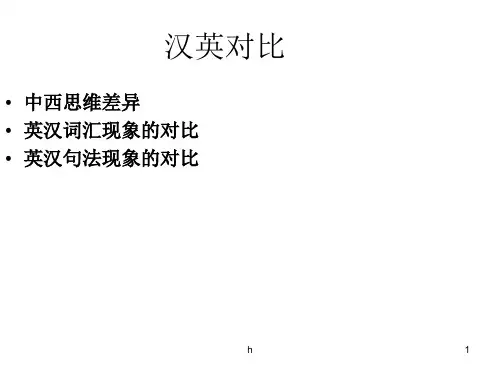
第三讲英汉词汇现象对比1. 中西思维的差异导致语言的差异思维与语言的关系犹如母与子的关系。
先有人类思维后有语言、图画、音乐等外在表现形式。
Language serves as dress of thought/Thoughts are always expressed by words /Without thinking,language would be meaningless 那么,思维又是如何作用在语言形式上的呢?通过研究可知:思维---表现法---语言具体形式。
中国自古以来就是传统的农业大国,即所谓“靠天吃饭”。
农业、土地与民生息息相关,所以就形成了“天人合一”这一中国文化的精髓。
即把人与自然视为和谐统一的整体,人类文化与天命自然统一。
The Taoist notion Of following nature is closedrelated,as in other naturalistic movements,to the idea of fate.这种中国文化的最高境界使中国人习惯于崇尚自然、行于自然;不违天命、顺其自然的处世哲学和宿命论,即Let things remain as they are.而在人与天地万物协调共存的世界中,则存在着循环往复、生生不息的发展变化。
美国人说这是moving in endless circles and repeating it over and over again。
中国的儒家与道家哲学就深深体现了这种观点。
如“道生一、一生二、二生三、三生万物,万物归于道”等,这就是汉民族的循回式思维方式,比如在语言表现法中有回环式:“人不犯我,我不犯人”,及递进式表达:“道高一尺,魔高一丈”。
所以,中国人表达事物总是按时间和事理发展顺序由因到果、由先到后、由大到小进行阐述,这种思维模式可称为具体一般型表达(Particular-General Pattern)。
英汉词汇差异对比举例英汉词汇差异是显而易见的。
由于英语和汉语有不同的文化背景和历史发展,因此它们在词汇表达上存在一些显而易见的差异。
以下是一些例子:1.饮食文化英汉饮食文化的差异表现在食物和饮料的词汇上。
英语中,人们经常使用“三明治”(三明治)来表示一个餐点,而汉语中则有“炒菜”的说法。
另外,英式早餐中经常会出现“cereal”(麦片)和“toast”(吐司)等词汇,而中式早餐则更注重“包子”、“油条”等食物的搭配。
2.交通出行英汉交通出行方面的词汇差异也很明显。
英语中,人们经常使用“汽车”(car)和“交通”(traffic)来表示汽车和交通工具,而汉语中则更多地使用“打车”(dial a taxi)和“地铁”(subway)等词汇。
此外,英式出行更注重乘坐公共交通工具,而汉语中则更多地使用私家车辆。
3.节日庆典英汉节日庆典方面的词汇差异也表现在词汇上。
英语中,人们经常使用“感恩节”(Thanksgiving)和“圣诞节”(Christmas)等节日名称,而汉语中则更多地使用“春节”(Chinese New Year)和“中秋节”(Mid-Autumn Festival)等节日名称。
4.商务交流英汉商务交流方面的词汇差异也很明显。
英语中,人们经常使用“商业活动”(business activity)和“公司”(company)等词汇,而汉语中则更多地使用“贸易”(trade)和“企业”(enterprise)等词汇。
通过以上这些例子,我们可以看到英汉词汇存在一定的差异。
这些差异表现在词汇的词义、用法和语调等方面,影响着英汉两国人在日常交流中的理解与沟通。
第一节英汉词汇现象的对比一、词的意义方面二、词的搭配能力方面三、词序方面一、词的意义方面(一)(英语中有些词与汉语)完全对应——主要是一些专用名词、术语和日常生活中的一些事物的名称。
如:The Pacific Ocean 太平洋helicopter 直升飞机minibus 面包车(二) 部分对应,如:marriage 娶,嫁gun 枪,炮sister 姐,妹(三)新词,没有汉语对应词。
如:overkill (核弹的)过度杀伤力,(宣传活动的)过度行为plumber 水管工,美国调查政府雇员泄密事件的特工(四)英语词义灵活,突出表现为一词多义polysemy,英语的词义主要视词的语境(上下文联系和词在句中的搭配关系)而定。
相比之下,汉语词义的稳定性就大得多。
英语中许多词一词多义,与汉语中几个不同词、词组对应。
如soft,除了“软的”、“柔的”,还有:1)无坚固掩护工事的,可攻破的:The record has been considered soft ever since it was set last May. 2)宇宙飞船的着陆飞行速度在32公里/小时左右,软着陆:The landing must be super-soft, made at a velocity of 18 miles or so an hour.3)毒性较轻的,软性的:Marijuana(大麻) is usually regarded as a soft drug..4)非百分之百可靠的:At this stage there is only soft intelligence about the enemy intention. We should not take action.作业:soft pillow soft cushion soft music soft woodSoft breeze soft drink soft money soft lightSoft voice soft fire soft hat soft answerSoft heart soft words soft goods soft water又如total,除了“总数达…”、“合计”外,还有1)彻底撞毁A POW returnee was given a new Ford by a Denver dealer and totaled it the next month.2)向…报复Did you at least total the guy that hit you?如story(1)事件、事情、情况、情形:1) This war is becoming the most important story of this generation.2) It is quite another story now.(2)报导、消息、电讯:Last December, the Post first reported that probes were being made in each of those cities, but officials refused to confirm the story. (3)内容、内情、真相:Some reporters who were not included in the session broke the story.(4)传说、说法:He’ll be very happy if that story holds up.(5)热门、谎言、有意的渲染:The story about him became smaller and by and by faded out from the American television.(6) 身世、遭遇:The story of Rita Hayworth is one of the saddest.(7)情节、案情:A young man came to Scotti’s office with a story.作业:1.He is the last man to come.2.He is the last man to do it.3.He is the last person for such a job.4.He should be the last man to blame.5.He is the last man to consult.6.This is the last place where I expected to meet you.2.英汉词义辨析法任何一个词都可能有三个词义:一是结构词义,二是涉指词义,三是情景词义。